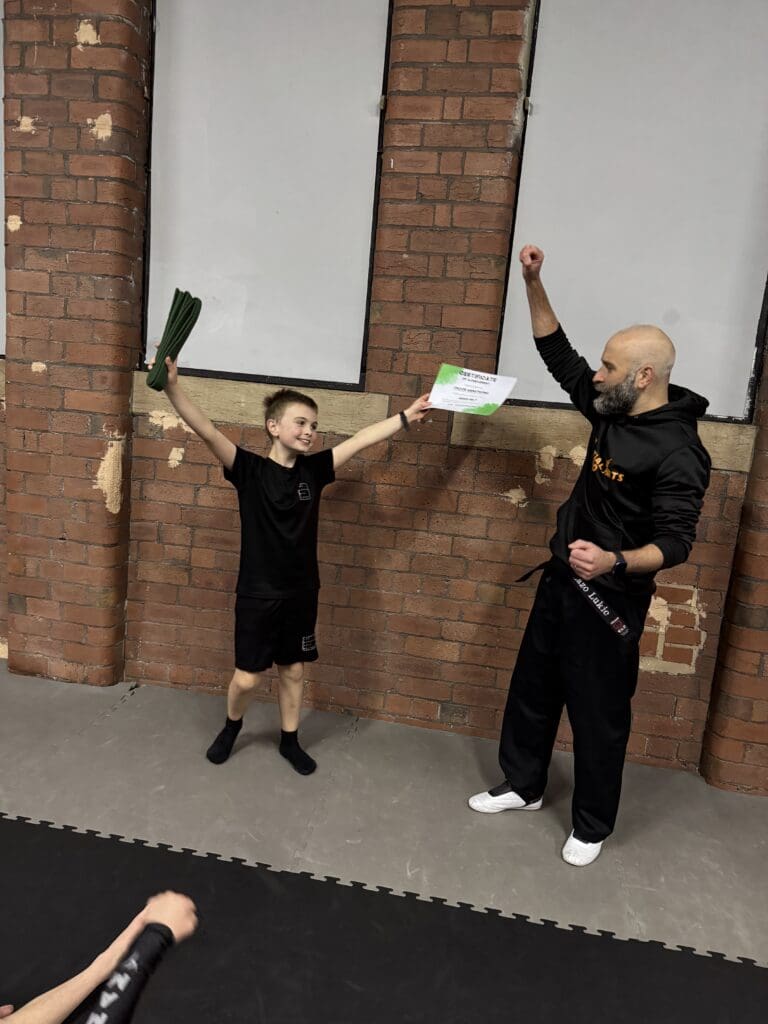Every parent wants their child to be both respectful and confident. But finding the right balance isn’t always easy.
Too much confidence without respect? It can lead to arrogance.
Too much respect without confidence? It can result in hesitation and insecurity.
So, how do you raise a child who is both self-assured and respectful?
The answer lies in consistent role modelling, clear guidance, and structured activities—like martial arts—that develop both qualities in harmony.
Let’s break it down into three essential steps.
Step 1: Teach Kids That Respect is a Strength
Many children see respect as something they have to do rather than something that benefits them.
It’s important to teach them that respect isn’t about being weak or submissive—it’s a sign of inner strength and character.
How Martial Arts Reinforces This Idea
✔ Bowing to instructors and training partners = Strength in humility.
✔ Listening carefully and following instructions = Strength in discipline.
✔ Showing control in sparring = Strength in self-restraint.
In martial arts, respect isn’t just about following rules—it’s about showing maturity, patience, and leadership.
When kids understand that respect makes them stronger, they embrace it rather than resist it.
Step 2: Help Kids Earn Respect, Not Demand It
Some children believe respect is something they should automatically receive, especially from younger kids or classmates. But real respect is earned through actions, not demanded by title or authority.
How to Teach This Lesson
✅ Encourage leadership by example – Teach kids that respect isn’t about telling others what to do but about leading through positive actions.
✅ Highlight the power of responsibility – Give them small leadership roles at home or in activities to help them understand respect and responsibility go hand in hand.
✅ Explain that respect isn’t about being liked – It’s about trust, integrity, and fairness—qualities that take time to build.
In martial arts, students earn respect through hard work and discipline, not just because of their belt rank or how long they’ve been training.
This teaches them a valuable life lesson: true respect is a reflection of character, not status.
Step 3: Encourage Healthy Self-Respect
Self-respect is the foundation of confidence. A child who values themselves will:
✔ Take care of their words, actions, and choices.
✔ Surround themselves with positive influences.
✔ Stand up for themselves without arrogance or aggression.
How Martial Arts Builds Self-Respect
✅ Goal-setting – Working towards new belt levels or mastering a technique instils a sense of achievement.
✅ Discipline & perseverance – Learning to push through challenges helps students build resilience and confidence.
✅ Positive reinforcement – Encouraging feedback from instructors and peers boosts self-worth.
A child who develops self-respect doesn’t tolerate bullying, negative peer pressure, or self-doubt. They stand tall, make good choices, and lead by example.
Final Thoughts: The Key to Raising a Respectful & Confident Child
Balancing respect and confidence isn’t about strict rules or constant discipline—it’s about consistent modelling, positive reinforcement, and structured guidance.
Martial arts provides an environment where children learn:
✔ Respect through action, not fear.
✔ Confidence through skill, not arrogance.
✔ Self-respect through discipline, perseverance, and leadership.
If you want your child to develop both qualities in a structured, engaging way, try a free martial arts class today and see these lessons in action!


